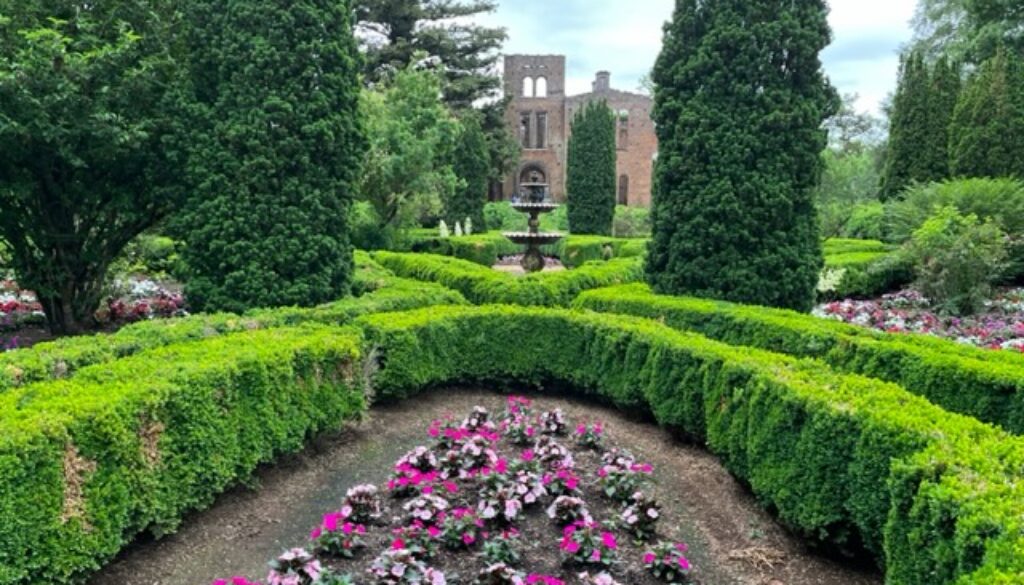The Happiness of Pursuit

Barnsley Gardens, GA
May 19, 2023
Last week we contemplated fear. Today we lighten the mood, and consider contentment.
What makes us happy?
The question has animated philosophy since systemic thought sprouted on Aegean shores. For centuries since, the hunt for happiness has followed countless trails of reflective contemplation and empirical inquisition.
Today, under a cool dawn at Barnsley Gardens, we pick up the scent. Like an overgrown bramble snagging a loose-fit sweater, the quest caught us. Now it holds us hostage, and we begin to think.
To release our thoughts, what better ransom than this rustic resort? Around the preserved ruins of an antebellum estate, the serene scene offers a tranquil escape.
A few horses trot before me as a local dog frolics in the distance. On a soft breeze, an orchestral aviary emits a symphony of song. In the lap of verdant hills in the north Georgia piedmont, a floral palette completes the canvas.
Roused by hot coffee and morning dew, we pick up our brush. Mixing philosophic pigment with pragmatic oil, we apply our paint with broad strokes. Within elusive lines, we try to find what brings people joy.
From Ionia to Attica, competing philosophers applied opposing force on the Greek mind. But they tended to tug in the same direction.
The ultimate goal was the good life. But what is that? Socrates didn’t offer an answer. He rarely did. Like a good lawyer or a bad balance sheet, he was more adept at raising questions.
But one of his hints was that a life worth living is also worth examining. So let’s hop on the scale, grab a stethoscope, and take our temperature. But with what thermometer, and by which metrics?
Happiness, like beauty, is in the eye of the beholder. But that doesn’t mean there aren’t essential elements, or eternal ones. The Romans emphasized virtue, the Greeks sought truth. These aren’t mutually exclusive, tho’ each can be evasive.
We think of “truth” as a quality; the Athenians thought it a process. Like the fruit of Tantalus, it was a receding horizon on a sea of ignorance…a noble destination that’s rarely reached.
Not that ancient thinkers didn’t try. But after Socrates and his immediate successors, the search shifted. Metaphysics subsided, and ethics came to the fore.
To center stage came a couple schools distorted by popular caricature. In the final centuries of the pre-Christian era, Stoics and Epicureans took the torch.
They both emphasized the power of perception. How should we react to what our senses perceive?
Many people regret yesterday and are nervous about tomorrow. But they’re fine right now, which is the only moment we have. Both schools suggested we seize it, to fulfill our potential by living as well as possible.
But how? To the Stoics it meant removing distractions, to live with virtue and control what you can.
Like the serenity prayer, we should focus only on what’s in our power. Radical responsibility entails changing what we can, recognizing what we can’t, and knowing the difference. This is the path from frustration to fulfillment.
To the Stoic, something outside our control is intrinsically neither “bad” nor “good.” It just “is.”
Only our reaction makes uncontrollable events positive or negative. Calling unavoidable events terrible or terrific is a judgment. But it isn’t stoic.
And, often as not, time reveals our interpretation to have been wrong. With increasing frequency, what we think matters ultimately doesn’t.
When we’re young, we’re drawn to material possessions and fleeting superficialities. As we age, these become what Stoics might call “preferred indifferences.” It’s fine to enjoy them. But possessing them shouldn’t define our life.
According to Epictetus, life is like a banquet. We should sample and savor it. If a plate is passed, we should take from it…but modestly. And mustn’t whine if we’re deprived of a portion.
Epicureans identified happiness as receiving pleasure and avoiding pain. But they emphasized perpetual happiness rather than passing pleasure, and concentrated on ethics more than even the Stoics did.
To Epicurus, fundamental truth is found through perceptions, preconceptions, and passions. Even reason is derivative of the senses. If the latter are wrong, the former will be false, and satisfaction suffers.
When Christ came, he overturned prior precepts as if they were tables in the Temple. But he etched many others like stones from Sinai. Such synthesis paved the Way, the Truth, and the Life. The map made, our challenge is to follow the path.
The trick lies in avoiding diversion, and abiding the trail. True happiness often relies less on attaining fulfillment than in seeking it.
In his book, The Happiness of Pursuit, Chris Guillebeau surmised that general happiness is found in particular pursuits. Persistent pleasure depends on having a purpose. Whether earning a degree, writing a book, or running a marathon, having objectives is what gives life meaning.
Whether grand or granular, deep down we desire goals, and yearn to pursue them. But most of us neglect to determine what they are, so we don’t know where to go.
As such, we end up all over the place. And when you’re everywhere, you’re nowhere. Wheels spin, mud flies, and the rut deepens. To get out we need a push, or a tow.
Where to find the motor to pull us from the mire? A good start is to supplant degradation, distortion, lies, and repugnance with truth, harmony, balance, and beauty.
That can be difficult. Especially when hustlers and charlatans convince a generation that’s had it easier than ever that happiness is impossible…yet envy, anger, bitterness, and despair are reasonable responses to any perceived deprivation.
Matthew Kelly wrote a book about our tendency to resist happiness. We may know what it takes to get what we want. Yet we engage in corrosive conduct that sabotages our success.
The deterioration is often subtle, and slow. Like gaining weight, it may not happen immediately. One cookie may not add a pound. But it makes the next one easier to eat.
Gandhi thought we were happy only when what we think and do are in harmony. The test is deciphering what we really think. Where do we want to be? And who? And why?
Many of us have never really known, or even thought to ask. But a place to start might be to understand what brings us joy, and strive to attain more of that. Sounds simple; almost simplistic.
Yet perhaps the reason so many are miserable is systematic suppression of the beauty and traditions that exert indelible influence over the human heart.
When assessing what we want, basic blessings often go without saying. But if we let things go without saying, we run the risk of going without.
Happiness is a pursuit, not a place. It’s a plan, and a process. It’s not so much the final score that matters as what we do when we have the ball. The destination is important. But it’s the journey that means the most.
Real joy comes along the way…from simple pleasures, and when those we love are truly happy. My wife’s smile. Our children’s success. A bed, a book, a candle…and a kiss.
What more do we really need?
JD



